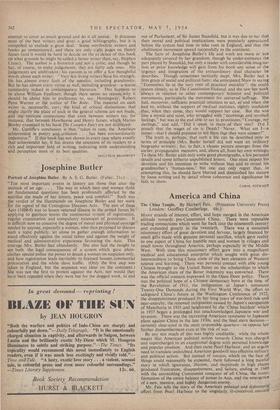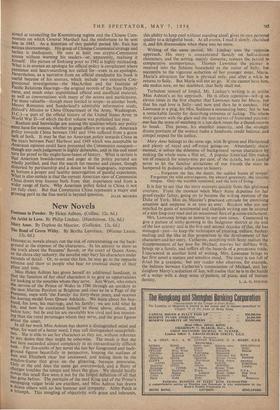America and China
MANY strands of interest, effort, and hope merged in the American attitude towards pre-Communist China. There were reputable trading connections which went far back into the nineteenth century and expanded greatly in the twentieth. There was a sustained missionary effort of great devotion and fervour, largely financed by small gifts made with genuine personal sacrifice, which gave reality to one aspect of China for humble men and women in villages and small towns throughout America, perhaps especially in the Middle West. With time this missionary effort grew into a magnificent medical and educational enterprise which sought with great dis- interestedness to bring China some of the best elements of Western science and learning. There was personal contact with able young Chinese brought to the United States on the scholarships to which the American share of the Boxer indemnity was converted. There was the official concern expressed in the Open Door policy. There was the political hope of a Chinese democracy born at the time of the Revolution of 1911, the indignation at Japan's notorious Twenty-One Demands during the First World War, the effort to safeguard China's future at the Washington Conference of 1922, the disappointment produced by her long years of war-lord rule and near-anarchy, the renewed indignation caused by. Japan's occupation of Manchuria in 1931 and heightened by the 'China Incident' which in 1937 began a prolonged but unacknowledged Japanese war and invasion. There was the increasing American resistance to Japanese plans againgt-China in the late 1930s, and the final stern decision— certainly clear-eyed in the most responsible quarters—to oppose her further dismemberment even at the risk of war.
By any test much of this was highly creditable; while the whole meant that American political action towards China was charged and supercharged town exceptional degree.with personal knowledge and popular emotion. And then came Pearl Harbour, and an urgent need to translate undoubted American goodwill into effective military and political action. But instead of success, which on the face of things could reasonably be expected,. there followed a long painful' story in which ignorance, illusion, and ineptitude in high places produced fruStration, disappointment, and failure, ending in 1949 with the astonishing Communist conquest of all China, the trans- formation of the entire balance of power in Asia, and the emergence of a new, massive, and highly dangerous enemy.
Mr. Feis tells the story of the American political and d;ploinall.c. effort from Pearl Harbour to the singularly ill-conceived mission
aimed at reconciling the Kuomintang regime and the Chinese Com- munists on which General Marshall had the misfortune to be sent late in 1945. As a historian of this painful period Mr. Feis has serious shortcomings. His grasp of Chinese Communist strategy and tactics is inadequate. He uses at least one crypto-Communist source without warning his readers—or, apparently, realising it himself. His picture of Sinkiang prior to 1942 is highly misleading. What is in essence an apologia for official policy is complacent where Penitence and heart-searching are called for—even in an apologist. Nevertheless, as a narrative from an official standpoint his book is useful because of his sources, which include two extensive Con- gressional investigations—the MacArthur and the Institute of Pacific Relations Hearings—the original records of the State Depart- ment, and much other unpublished official and unofficial material. as well as conversations with many of the actors and participants. Far more valuable—though more limited in scope—is another book, Messrs ROmanus and Sunderland's admirably informative study, Stilwell's Mission to China (Department of the Army, Washington, D.C.)--a part of the official history of the United States Army in World War II—of which the first volume was published last year. Realism and knowledge are among the qualities which any policy" must have for success, whether in great affairs or in small. American Policy towards China between 1941 and 1946 suffered from a grave lack of both. It may be that no American policy towards China in the years between Pearl Harbour and 1949 which was acceptable to American opinion could have prevented the Communist conquest— though any such judgement is highly debatable, and in the end must turn for proof to the might-have-beens of history. What is certain is that American bewilderment and anger at the policy pursued are wholly justified, and that the search for reasons and causes, though distorted by partisanship and a desire to find scapegoats, represents at bottom a .proper and healthy interrogation of painful experience. What is also certain is that the current American view of Communist China draws true lessons both from that experience and from a wider range of facts, Why American policy failed in China is not Yet fully clear. But that Communist China represents a major and growing peril to the free world is beyond question. JULES MENKEN











































 Previous page
Previous page